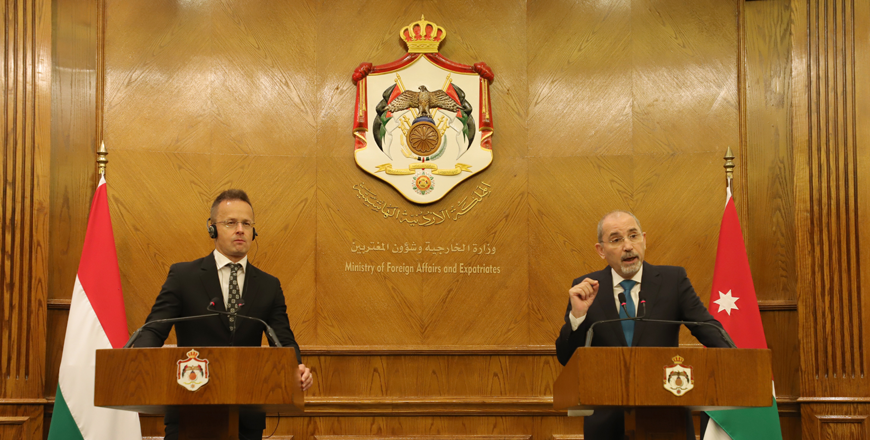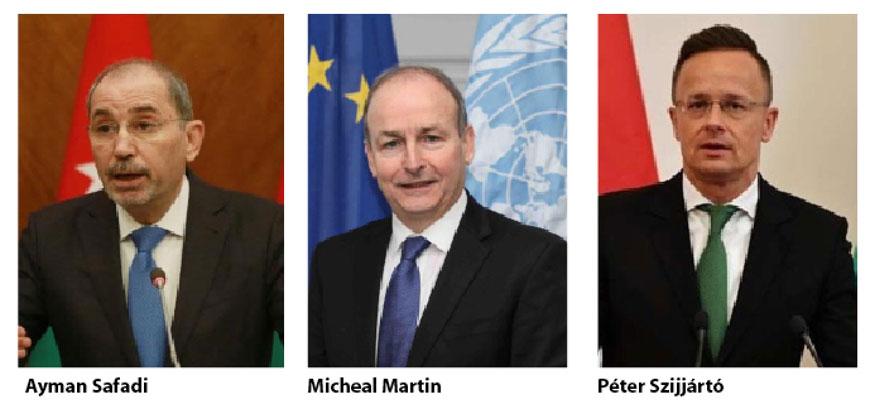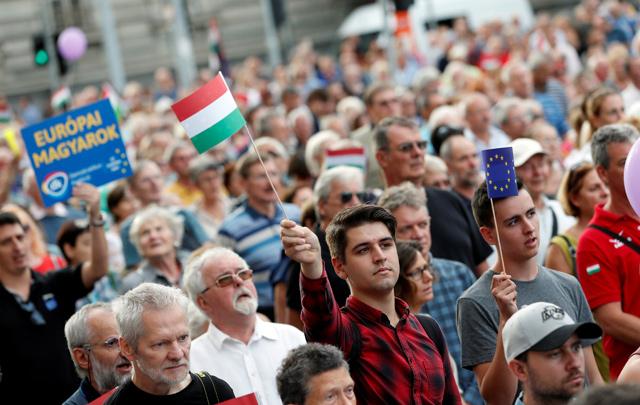You are here
Safadi, Hungary's Szijjártó discuss bilateral relations, refugees, war in Gaza
By JT - May 23,2024 - Last updated at May 23,2024

Deputy Prime Minister and Foreign Minister Ayman Safadi and Hungarian counterpart Peter Szijjártó on Wednesday hold a joint press conference in Amman (Petra photo)
AMMAN — Deputy Prime Minister and Foreign Minister Ayman Safadi on Wednesday held expanded talks with his Hungarian counterpart Peter Szijjártó on bilateral relations and the situation in Gaza and the efforts exerted to impose a ceasefire in the war-torn strip.
At a joint press conference with Szijjártó, Safadi welcomed the announcement made by Spain, Norway and Ireland to recognise the Palestinian state, adding that more European countries would follow suit.
"We value this decision and consider it a major step in emphasising that the two-state solution as the only way to achieving peace," Safadi said, expressing hope for a wider international effort to "impose peace and put the region and the entire world on a well-defined path towards a just and lasting peace".
Safadi also voiced concerns over the deteriorating situation and the continuation of illegitimate measures in the occupied West Bank, including an Israeli minister storming of Al Aqsa Mosque in violation of the international law.
He also said that such “provocative measures” will lead to more tension and instability.
Safadi said he had “fruitful” talks with the Hungarian foreign minister on bilateral relations that resulted in the signing of four memoranda of understanding, including one on providing 400 scholarships for Jordanian students in Hungarian universities.
He also said that Jordan and Hungary are keen on advancing their relations forward, especially with the two countries celebrating this year the 60th anniversary for establishing diplomatic ties.
On the war on Gaza, Safadi said the said that the situation in the Strip is deteriorating especially with several international relief organisations announcing halt to their services due to the restrictions imposed by the Israeli occupation forces.
“The situation is already on the verge of explosion and we have seen decisions by other ministers allowing illegal settlers returning to settlements which Israel has dismantled years ago,” Safadi said, adding “Such measures send but one single message that this Israeli government is carrying on with its illegal measures that undermine peace and the two-state solution and that push the region towards more escalation and instability.”
Safadi said that Jordan and all Arab states supported the talks Egypt, Qatar and the US sponsored to achieve ceasefire and end the war in Gaza, adding, “We want an end to this conflict but its causes have to end first. All Arab states have condemned the killing of civilians on October 7 but we never heard a single Israeli official condemning the killing of more than 35,000 Palestinians in Gaza, 70 per cent of them were children and women.”
“October 7 did not happen in a vacuum and we have to put the issue within its context to know how to deal with it. The root cause for the region’s conflict is the occupation.”
For his part, Szijjártó expressed appreciation for Jordan’s support to refugees, saying, “If Jordan did not provide for hundreds of thousands of refugees, we would have done that. Jordan deserves support from Europe.”
He also said that Hungary, during its presidency of the EU, would request a meeting of the European-Jordanian Council to discuss ways of support to the union could extend to Jordan to alleviate the burdens on the Kingdom and on Europe resulting from immigration influxes.
Szijjártó said that Hungary has extended $4 million to Jordan over the last five years in assistance to refugees and, adding that an office for Hungary Helps would open in Jordan so that his country would be able to continue with this humanitarian work.
Szijjártó said, “Hungary’s position is based on four points regarding the current situation in the Middle East. First, we reject terrorism, extremism … and what happened on October 7 is unacceptable to us, and the international community must come together to prevent something like this in the future. Secondly, civilians must be protected in any armed conflict that may occur in the world for any reason. Thirdly, refugees must be assisted and humanitarian work must not be hindered …Fourthly, there is a Hungarian citizen still among the hostages, so it is very important for us that the hostages be freed and have their freedom regained.”
Related Articles
AMMAN — Foreign Minister Ayman Safadi on Wednesday met with his Hungarian counterpart Péter Szijjártó over bolstering the two countries ties
AMMAN — Deputy Prime Minister and Foreign Minister Ayman Safadi on Monday received a phone call from his Irish counterpart Micheal Martin, d
GENEVA — Hungary’s foreign minister accused UN officials Wednesday of “spreading lies” with their criticism of Budapest’s anti-migration pol

















